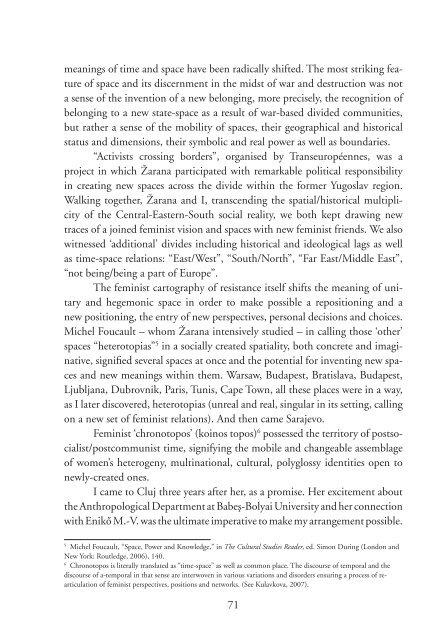Teaching Subjectivity. Travelling Selves for Feminist ... - MailChimp
Teaching Subjectivity. Travelling Selves for Feminist ... - MailChimp
Teaching Subjectivity. Travelling Selves for Feminist ... - MailChimp
You also want an ePaper? Increase the reach of your titles
YUMPU automatically turns print PDFs into web optimized ePapers that Google loves.
meanings of time and space have been radically shifted. The most striking feature<br />
of space and its discernment in the midst of war and destruction was not<br />
a sense of the invention of a new belonging, more precisely, the recognition of<br />
belonging to a new state-space as a result of war-based divided communities,<br />
but rather a sense of the mobility of spaces, their geographical and historical<br />
status and dimensions, their symbolic and real power as well as boundaries.<br />
“Activists crossing borders”, organised by Transeuropéennes, was a<br />
project in which Žarana participated with remarkable political responsibility<br />
in creating new spaces across the divide within the <strong>for</strong>mer Yugoslav region.<br />
Walking together, Žarana and I, transcending the spatial/historical multiplicity<br />
of the Central-Eastern-South social reality, we both kept drawing new<br />
traces of a joined feminist vision and spaces with new feminist friends. We also<br />
witnessed ‘additional’ divides including historical and ideological lags as well<br />
as time-space relations: “East/West”, “South/North”, “Far East/Middle East”,<br />
“not being/being a part of Europe”.<br />
The feminist cartography of resistance itself shifts the meaning of unitary<br />
and hegemonic space in order to make possible a repositioning and a<br />
new positioning, the entry of new perspectives, personal decisions and choices.<br />
Michel Foucault – whom Žarana intensively studied – in calling those ‘other’<br />
spaces “heterotopias” 5 in a socially created spatiality, both concrete and imaginative,<br />
signified several spaces at once and the potential <strong>for</strong> inventing new spaces<br />
and new meanings within them. Warsaw, Budapest, Bratislava, Budapest,<br />
Ljubljana, Dubrovnik, Paris, Tunis, Cape Town, all these places were in a way,<br />
as I later discovered, heterotopias (unreal and real, singular in its setting, calling<br />
on a new set of feminist relations). And then came Sarajevo.<br />
<strong>Feminist</strong> ‘chronotopos’ (koinos topos) 6 possessed the territory of postsocialist/postcommunist<br />
time, signifying the mobile and changeable assemblage<br />
of women’s heterogeny, multinational, cultural, polyglossy identities open to<br />
newly-created ones.<br />
I came to Cluj three years after her, as a promise. Her excitement about<br />
the Anthropological Department at Babeş-Bolyai University and her connection<br />
with Enikő M.-V. was the ultimate imperative to make my arrangement possible.<br />
5<br />
Michel Foucault, “Space, Power and Knowledge,” in The Cultural Studies Reader, ed. Simon During (London and<br />
New York: Routledge, 2006), 140.<br />
6<br />
Chronotopos is literally translated as “time-space” as well as common place. The discourse of temporal and the<br />
discourse of a-temporal in that sense are interwoven in various variations and disorders ensuring a process of rearticulation<br />
of feminist perspectives, positions and networks. (See Kulavkova, 2007).<br />
71

















